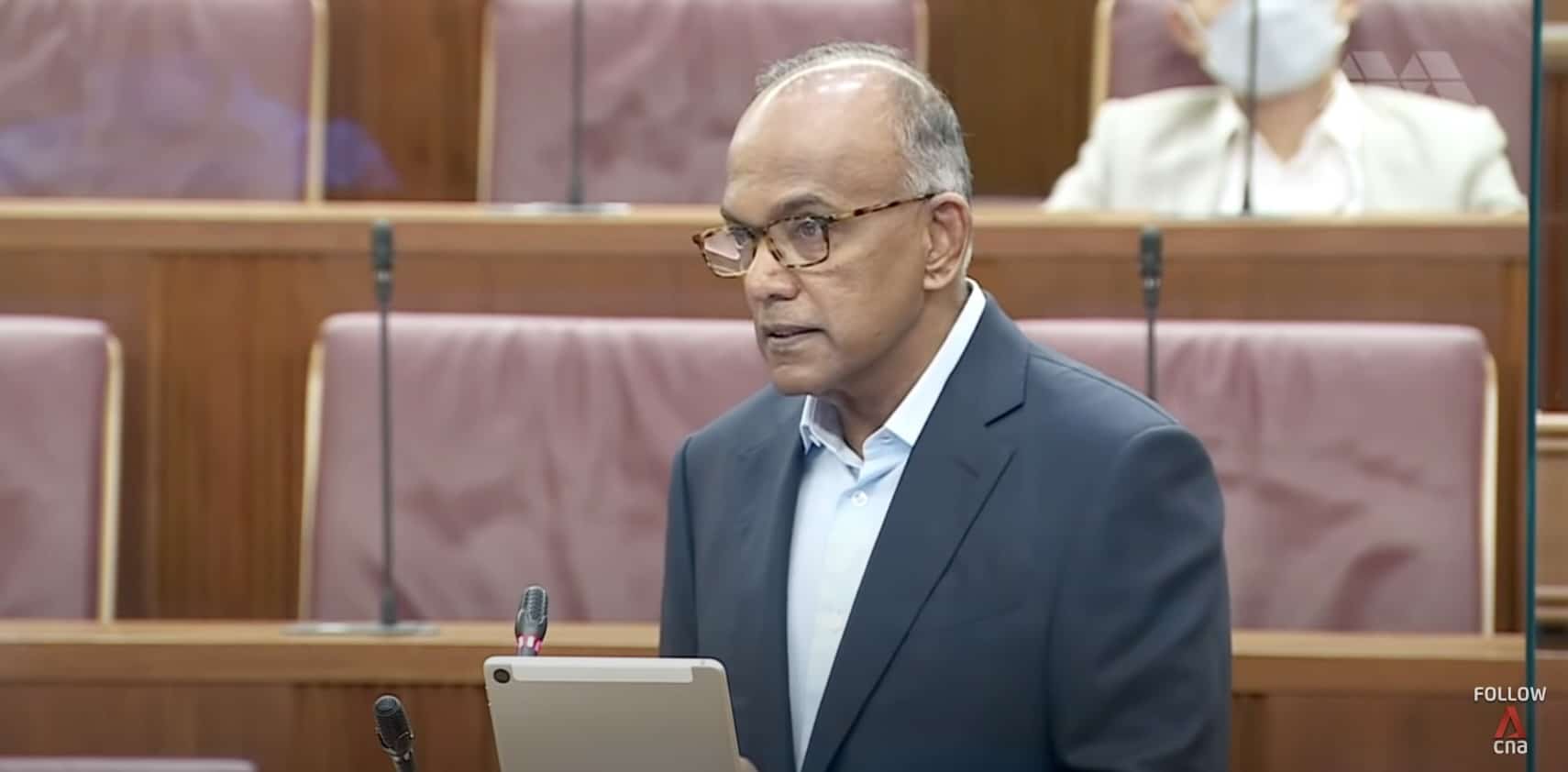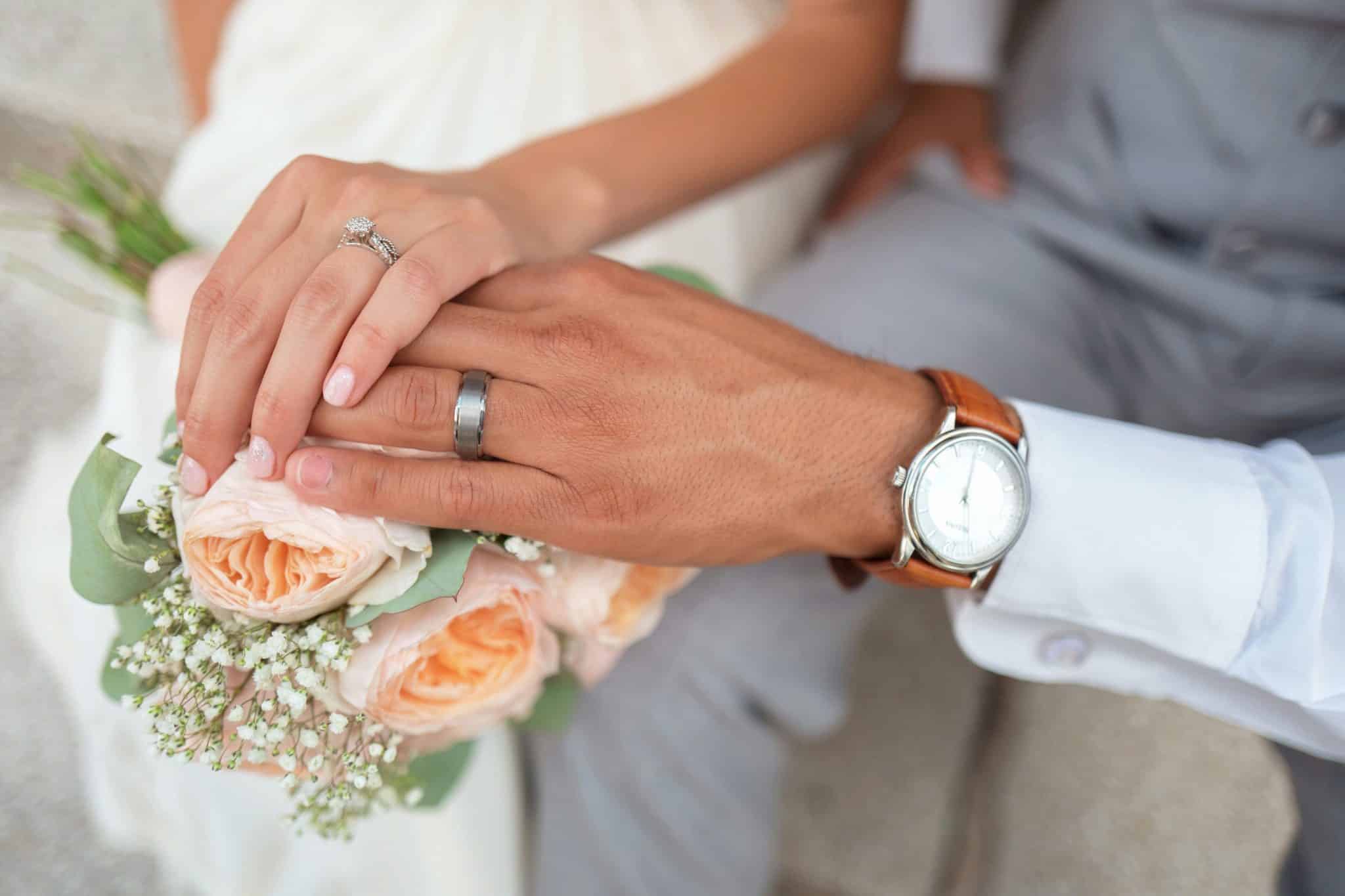Government looking to safeguard position of marriage as between man and woman: Minister K Shanmugam
Salt&Light // July 30, 2022, 11:49 pm

Home Affairs and Law Minister K Shanmugam speaking at the parliamentary debate on March 3. Screengrab of a CNA telecast on the debate.
Mr K Shanmugam, Singapore’s Minister for Home Affairs and Law, said on Saturday, 30 July 2022, that the Government is looking to “safeguard the current legal position on marriage from being challenged in the courts”.
“Most people that we’ve spoken with want the current position on marriage to be retained. And the current position is that the law defines marriage as being between a man and a woman,” he said on the sidelines of a community event.
He added the Government has been in “extensive discussions” with various groups – including religious leaders and lesbian, gay, bisexual, and transgender (LGBT) representatives – on whether changes might be needed to Section 377A, the law which criminalises gay sex between men.
Any decision on Section 377A would likely be made in Parliament, rather than in the Courts, where it has faced various Constitutional challenges over the years, he said.
Explainer: What is Section 377A?
Section 377A is part of Singapore’s Penal Code, which spells out criminal offences and penalties in Singapore. It states:
Any male person who, in public or private, commits, or abets the commission of, or procures or attempts to procure the commission by any male person of, any act of gross indecency with another male person, shall be punished with imprisonment for a term which may extend to 2 years.
What is the Government’s position on Section 377A?
While it remains on the books, Section 377A is not enforced, meaning it serves as a moral signpost of sorts in our society.
“The family is the basic building block of this society … And by family in Singapore we mean one man, one woman”: PM Lee Hsien Loong.
As Prime Minister Lee Hsien Loong explained in Parliament in 2007:
“Singapore is basically a conservative society. The family is the basic building block of this society … And by family in Singapore we mean one man, one woman marrying, having children and bringing up children within that framework of a stable family unit … I acknowledge that not everybody fits into this mould. Some are single, some have more colourful lifestyles, some are gay. But a heterosexual, stable family is a social norm.
“So we should strive to maintain a balance: to uphold a stable society with traditional heterosexual family values, but with space for homosexuals to live their lives and to contribute to the society.
“We don’t harass gays. The Government does not act as moral policeman. And we don’t proactively enforce Section 377A on them. … I think we have been right to adapt, to accommodate homosexuals in our society, but not to allow or encourage activists to champion gay rights (as) they do in the West.”
This viewpoint has been echoed over the years, such as by PM Lee again in 2019, and by Mr Shanmugam in a BBC interview earlier this year.
However, in his most recent comments, Mr Shanmugam said: “Many agree that men who have sex with each other should not be thrown into prison. Gay sex should not be criminalised” – suggesting a possible rethink of the law.
What are the challenges against Section 377A?
Over the years, plaintiffs have cited Article 12 of the Singapore Constitution – which guarantees all Singaporeans equality in the eyes of the law – to suggest that Section 377A is unconstitutional.
The judges have thus far dismissed the cases, citing how the Courts are not in a position to decide on Singapore’s moral values, with any such changes to be made in Parliament instead.
The most recent challenge to Section 377A was dismissed by Singapore’s apex Court of Appeals in February this year as an “extra-legal question well beyond the purview of the courts”, while acknowledging the “underlying complexity” of the issue.
What is the Government’s position on marriage?
In his comments on 30 July, Mr Shanmugam said that, in line with what was viewed as the majority viewpoint, the Government is looking into how to safeguard the current legal position on marriage, as between man and woman.
“Most people that we’ve spoken with want the current position on marriage (as being between a man and a woman) to be retained”: Mr K Shanmugam.
“Most people that we’ve spoken with want the current position on marriage to be retained. And the current position is that the law defines marriage as being between a man and a woman,” he said. The Women’s Charter explicitly prohibits same-sex marriages.
“People don’t want that to change. And people also do not want any change to the current policies that take reference from this definition of marriage.”
“We are also considering how can we safeguard the current legal position on marriage from being challenged in the courts, so that it does not get challenged like the way Section 377A was in a series of cases.”
What could happen if Section 377A is repealed?
While Mr Shanmugam has called for all parties to “not push positions which can damage society” and to “avoid extreme positions and avoid extreme demands”, pro-LGBT advocates have lobbied for politicians to repeal Section 377A.
“It now falls on Parliament to deal the final blow to Section 377A. Pink Dot SG urges Singapore’s leaders to act urgently and decisively to repeal this redundant law,” Pink Dot said in February this year.
Another speaker at the annual Pink Dot event this year said that “if 377A is repealed, it’s the beginning of a long road to equality, not the end”.
This “long road to equality” would cover ground including what is permissible in the sex education curriculum in schools, LGBT portrayals on local media, or ratings for foreign movies with LGBT scenes, for example.
One concern religious leaders in Singapore have expressed in its closed-door discussions with the authorities is the potential erosion of Freedom of Religion, which is protected in Article 15 of the Singapore Constitution.
For example, in Australia, a recent law banning “gay conversion therapy” outlaws practices that seek to change or suppress a person’s sexual orientation or gender identity – even if the act is consensual on the part of the person in question seeking help.
While some treatments clearly cross the line and should be banned, such as electroshock therapy, the concern is that many common faith practices would no longer be permissible under such blanket rules. Even prayer would constitute a breach of the law, if the prayer is intended to change or suppress an individual’s sexual or gender identity.
Meanwhile, religious institutions would not be able to turn down requests for same-sex marriages in their premises, nor be able to step down leaders or excommunicate members who are practicing homosexuals, or be charged with discriminatory practices.
We are an independent, non-profit organisation that relies on the generosity of our readers, such as yourself, to continue serving the kingdom. Every dollar donated goes directly back into our editorial coverage.
Would you consider partnering with us in our kingdom work by supporting us financially, either as a one-off donation, or a recurring pledge?
Support Salt&Light




